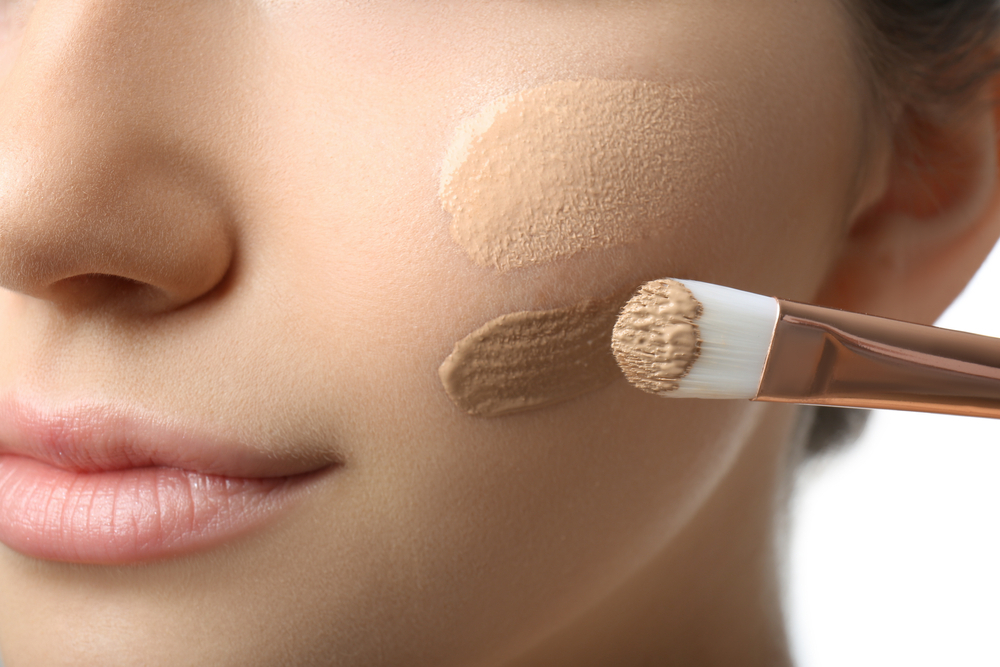We're lucky to have so many options at our disposal when it comes to achieving a healthier, more flawless complexion. Still, many skin care and beauty products have some overlap (moisturizer with SPF vs. sunscreen, anyone?). This can make it tough to know whether you should continue to pile on the layers or simplify your routine into one step. Two such products are foundation and tinted sunscreen.
The question is: Can you use tinted sunscreen as foundation? And in what ways is tinted sunscreen like foundation, anyway? Foundations and tinted sunscreens both offer coverage, but they fulfill different needs. If you're stuck trying to choose between the two, let this be your guide so you can pick the right one for you—and your skin.
What Is Tinted Sunscreen?
When you picture traditional sunscreen, you probably envision a white cream or lotion. Aptly named, tinted sunscreen switches this up with added pigments to give the formula a colored tint. Tinted sunscreen can provide the same benefits that untinted formulas can—namely broad-spectrum SPF protection from damaging ultraviolet (UV) light.
Beyond this, tinted sunscreen increases blendability and minimizes the white cast that often comes with traditional formulas, especially those containing Zinc Oxide. Tinted sunscreen also protects against blue light from phone and computer screens, which is a big bonus.
What Is Foundation?
Foundation is a cosmetic product that provides coverage first and foremost. Similar to tinted sunscreen, it contains pigments—just in a higher concentration. Foundations come in three main forms: liquid, powder, and stick. Which type of foundation you use depends on your personal preference and skin type. For example, people with oily skin often benefit from using a powder foundation since this finish can help mattify skin. A liquid foundation, on the other hand, can be great for people with dry skin, especially if it includes hydrating ingredients like Hyaluronic Acid or Glycerin.
Foundations also range in coverage. If you're going for a more natural look, you can opt for super-blendable sheer coverage. If you're looking for something to hide skin concerns such as hyperpigmentation or acne, full-coverage foundation can give you that flawless finish.
How Is Tinted Sunscreen Like Foundation?
Tinted formulas' subtle hue offers light coverage, which can even out skin tone and reduce redness. Many tinted sunscreens also contain nourishing and brightening skin care ingredients, such as Hyaluronic Acid and Niacinamide. For example, EltaMD UV Clear Tinted Broad-Spectrum SPF 46 packs a two-in-one punch with broad-spectrum protection and sheer coverage for a smoother, more even complexion.
When Can You Use Tinted Sunscreen as Foundation?
Tinted sunscreen and foundation have entirely different functions, so they're not interchangeable. One protects your skin from sun damage with a subtle hue, while the other is responsible for coverage and color correction.
If you're only looking for light coverage, the amount of pigment in a tinted sunscreen formula can give you that natural, glowy effect and reduce the appearance of blemishes and discoloration—no foundation necessary. But tinted sunscreen won't totally cover up more severe cases of hyperpigmentation or breakouts. So it really comes down to how much coverage you're looking for.
Consider your skin type, too. Full-coverage foundation can go on heavy and may include pore-clogging ingredients, which can cause breakouts. If you have oily or acne-prone skin, using a lightweight, noncomedogenic tinted sunscreen can help you feel more confident while promoting a clear complexion, which can ultimately reduce your coverage needs.
EltaMD offers tints in multiple shades with our Deep Tinted SPF being uniquely designed and tested to match and blend in to deeper skin tones for a sheer finish without a white cast.
Let Your Skin Decide
If you're trying to decide between tinted sunscreen and foundation, ask yourself:
- What are my primary skin concerns?
- What type of coverage am I looking for?
- How much do I want to simplify my skin care routine?
If you're looking for lightweight coverage and a quicker, simpler morning routine, you can rely on tinted sunscreen for your sun care and cosmetic needs. If you want full coverage to give you that flawless finish, a foundation can do wonders. Think about what you want your products to do for you and your skin. The beauty of a skin care routine is that you get to design it and adapt it as you go to meet your skin's changing needs.
